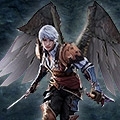Kanji Create Atmosphere -- Of Controversy

Chocobos are called horse-birds now -- it's true. Don't try to fight it; your character will be deleted if you even type "chocobo" into the chat bar. Now, fly, my minions and spread these words across the Internet!
OK, now if there are any people left reading this -- people who don't have an axe to grind against Square Enix -- let's look at what is really going on here.
Kanji and controversy, my two favorite things to write about.
Look, I have levied my fair share of criticism against Square Enix, and I will point out, let's say, an error in judgement now and again. However, this latest outrage is misplaced to some extent. Maybe I'm just biased in my passion for studying kanji, but there is a legitimate other side to this story, too.
People like to point to Japanese forums as the be-all end-all of the state of Final Fantasy XIV. In some cases, they are helpful for early news and inside information because so many publications and interviews only release in Japan. However, in other cases, they can be just as misinformed and quick to lash out as a troll running through our very forums. If there's any meme that transcends borders, it is "haters gonna hate."
So, the source of the rage is a thread on 2ch in which players noticed that in the version Japanese version of Final Fantasy XIV, ãƒãƒ§ã‚³ãƒœ (Chocobo) has been replaced with the term 馬鳥, which is literally 馬horse + é³¥bird. Soon, blogs were reporting on the thread, and eventually overseas gaming sites picked up on the story as well. As you can read in the link at the beginning of the article, this stylistic choice has blossomed into a full-fledged conspiracy, with people claiming Square Enix has developed the game in China, or at least intentionally designed it to appeal to Chinese.
Now, it is true that in some instances, Japanese players will see an ideograph meaning "horse-bird." For instance, Chocobo Blood and Chocobo Feather use the infamous "horse-bird" term, but Chocobo Fly and Chocobotail Saw use the traditional katakana "Chocobo." Chocobo as animals are 馬鳥, and things produced from Chocobo are labeled "Chocobo [item name]."
Kanji represent ideas and concepts. Just like a woodpecker is 啄木鳥 (ki-tsu-tsu-ki, a tree木 peckingå•„ birdé³¥), 馬鳥 is a bird that is mounted and ridden like a horse -- a horse-bird. However, both of these terms are read in ways that defy the standard readings assigned to their kanji. These are called ateji 当ã¦å— -- kanji used for their meaning independent of their reading. So, 馬鳥 is not a replacement name for Chocobo, but rather serves as a visual representation of the what a Chocobo is for the purposes of the written language of Eorzea.
Does that make any sense? Just trying to make this comprehensible was a chore, so I'm sure you are asking "what is the point of all this?" Well, as is often the case recently, the answer can be found on Producer Hiromichi Tanka's Twitter feed:

XI had this as well, but Chinese-sounding names are a simple way to create a different cultural atmosphere as opposed to English-sounding names. This so-called "Japan-made Chinese" is comprised of words created by Japanese people, so I'm thinking they will be translated differently in the actual Chinese version of the game.
Tanaka and the developers wanted to create a different atmosphere in Eorzea. It's a medieval, fantastical land with a rich and detailed history. This is quite noticeable in the English version of the game as well, with word choice alone creating its own buzz. To put it simply: Old-timey Japanese is Chinese. The farther back you go in Japanese literature, the more and more influence you see from China. In fact, many idioms and proverbs are adapted from Chinese sayings and expanded into Japanese sentences.
To add further explanation, an apology notice was also issued on the official beta tester site. There, World Concept Planner Kenichi Iwao explained that beyond creating a certain atmosphere for Eorzea, excessive use of English loan-words might be confusing. Using kanji-based terms let's any player understand what an item is without extensive knowledge of Final Fantasy or role-playing games.
Let's take one of the controversial changes as listed by Japanese bloggers as an example: Mythril. Usually, mythril, as an English word created by J.R.R. Tolkien, is put into katakana (ミスリル). In FFXIV, they use 霊銀 (rei-gin) which is 銀silver infused with 霊spiritual or elemental power. However, it is again only used in specific cases. The kanji term is used for Mythril Ore, while the phonetic English term is used for Mythril-based products like this lovely Mythril Wristlet. So, the idea here is that "spiritual silver" written in kanji gives the player a better grasp of the concept of Mythril while equipment made from this mineral is still called "Mythril" equipment.
Anyway, I love this stuff; I could go on for hours, but I'll wrap things up here. Personally, I think the choices Square Enix have made regarding language-use are very interesting. At the same time, I can also understand the frustration some players are feeling. Final Fantasy XI was already fairly kanji-heavy, and FFXIV has really dialed that way up. There are many cases of common kanji being swapped out for older alternatives, and some of the terms are kind of awkward and are more suited for a historical real-time strategy game.
So what does Square Enix think? Well, they agree! In addition to using their beta site apology to promise changes, Tanaka tweeted up again and pointed (or passed the buck, depending on who you ask) to World Concept Planner Iwao for including the large amount of difficult kanji. Referencing "horse-bird" directly, Tanaka admitted that there are some confusing terms, which they plan to fix.
Bottom line, your Chocobo is here to stay.






